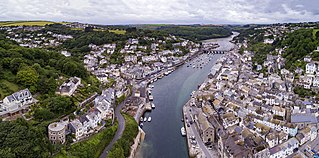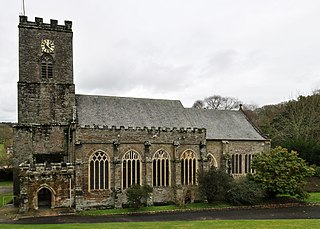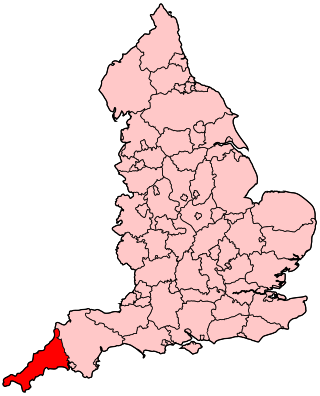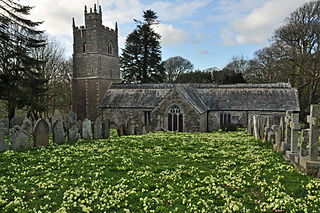Related Research Articles

Looe is a coastal town and civil parish in south-east Cornwall, England, United Kingdom, with a population of 5,280 at the 2011 census.

Sir Jonathan Trelawny, 3rd Baronet was Bishop of Bristol, Bishop of Exeter and Bishop of Winchester. Trelawny is best known for his role in the events leading up to the Glorious Revolution which are sometimes believed to be referenced in the Cornish anthem "The Song of the Western Men".

Sithney is a village and civil parish in the West of Cornwall, England, United Kingdom. Sithney is north of Porthleven. The population including Boscadjack and Crowntown at the 2011 census was 841.

Glasney College was founded in 1265 at Penryn, Cornwall, by Bishop Bronescombe and was a centre of ecclesiastical power in medieval Cornwall and probably the best known and most important of Cornwall's religious institutions.

Ashbury is a village and former civil parish, now in the parish of Northlew, in the West Devon district, in the county of Devon, England. It is 5 miles (8 km) south-west of Hatherleigh. Its population is 65.

Brigadier-General Henry Trelawny was a British Army officer of Cornish descent, a Member of Parliament and Vice-Admiral of Cornwall.
Thomas Wynter or Winter was the Archdeacon of York, Richmond, Cornwall, Provost of Beverley, Dean of Wells Cathedral and the illegitimate son of Cardinal Thomas Wolsey.

Lawhitton is a village in the civil parish of Lawhitton Rural, in east Cornwall, England, United Kingdom. The village is situated two miles (3 km) southwest of Launceston and half-a-mile west of Cornwall's border with Devon at the River Tamar.

Lansallos is a village in the civil parish of Polperro in south Cornwall, England, United Kingdom. It is situated between Polruan and Polperro about 5 miles (8 km) east of Fowey in Liskeard Registration District.

Morval is a rural civil parish, hamlet and historic manor in southeast Cornwall, England, United Kingdom. The hamlet is approximately two miles (3 km) north of Looe and five miles (8 km) south of Liskeard.

Christianity in Cornwall began in the 4th or 5th century AD when Western Christianity was introduced as in the rest of Roman Britain. Over time it became the official religion, superseding previous Celtic and Roman practices. Early Christianity in Cornwall was spread largely by the saints, including Saint Piran, the patron of the county. Cornwall, like other parts of Britain, is sometimes associated with the distinct collection of practices known as Celtic Christianity but was always in communion with the wider Catholic Church. The Cornish saints are commemorated in legends, churches and placenames.
William Warham was a late-medieval English ecclesiastical administrator who was Archdeacon of Canterbury from c. 1505 to 1532 during the archiepiscopate of his uncle William Warham, Archbishop of Canterbury.
Bodrugan is a Cornish surname and placename. It may refer to:
William Bodrugan may refer to:

Sir Henry de Bodrugan was a Cornish landowner, knight and politician.
William Beaumont (1427–1453) was lord of the manor of Shirwell in North Devon and a substantial landholder in Devon.

The following outline is provided as an overview of and topical guide to Cornwall: Cornwall – ceremonial county and unitary authority area of England within the United Kingdom. Cornwall is a peninsula bordered to the north and west by the Celtic Sea, to the south by the English Channel, and to the east by the county of Devon, over the River Tamar. Cornwall is also a royal duchy of the United Kingdom. It has an estimated population of half a million and it has its own distinctive history and culture.
Sir Otto I Bodrugan, his name often written at the time as Otes, was an English landowner, soldier and politician from St Goran in Cornwall.

St Martin's Church is a parish church in the hamlet of St Martin, Looe, Cornwall, in the Church of England Diocese of Truro.
Otto Bodrugan, of Bodrugan, Cornwall, was an English politician who was MP for Cornwall in the Parliament of April 1384. He was the son of Otto Bodrugan, and his illegitimate son was William Bodrugan.
References
- Whetter, James, The Bodrugans: a study of a Cornish Medieval knightly family, Lyfrow Trelyspen, 1995
- Whetter, James, The History of Glasney College, 1988